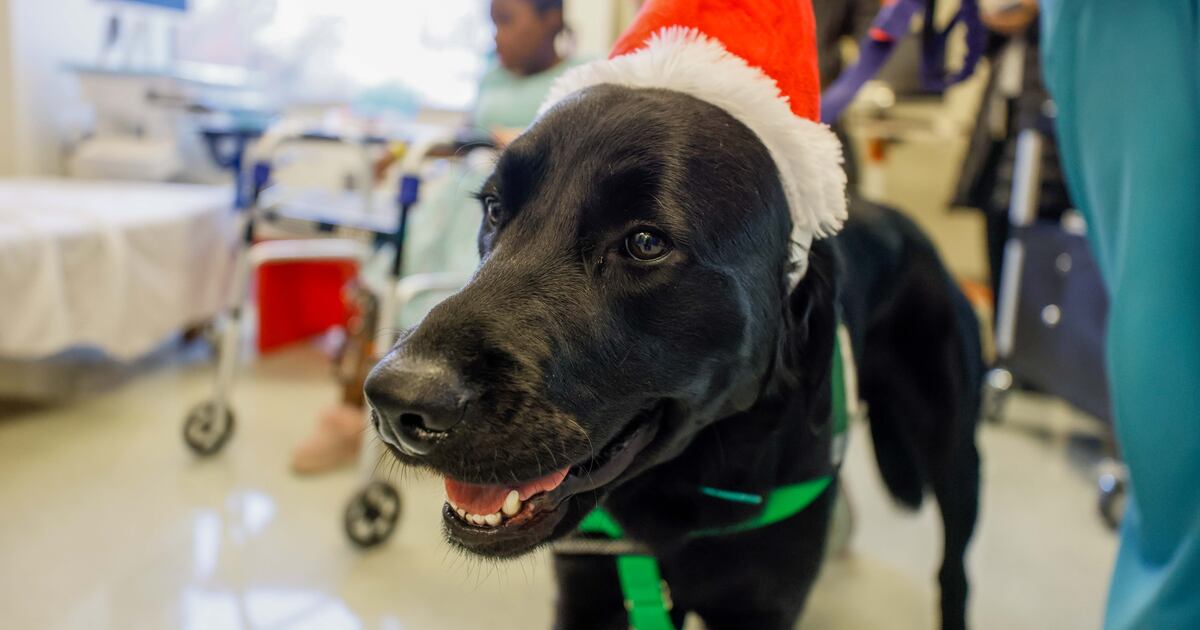Conway, new therapy dog at Children’s Healthcare, cheers kids with canine charm

“He helps people want to go to therapy more,” said Emily, who has skeletal dysplasia, a rare disorder that affects the development of bones, joints, and cartilage. “It makes it something you look forward to.”
In late November, she underwent limb surgery on her right leg. Limb surgery can help people with skeletal dysplasia walk by correcting bone growth abnormalities, but the process can be arduous. Emily’s right leg now has a metal frame that holds the bones in place. Small rods go through the skin and into the bone, and adjustable bars are turned to slowly lengthen the bone.
Just days after Emily’s surgery, Conway entered the picture at Children’s Healthcare of Atlanta’s Scottish Rite campus. Now he’s a regular visitor in her hospital room.
“I’ve seen her in her hospital bed, crying out, saying she really hurts,” said Emily’s mom, Isoken Owie. “And then she saw Conway, and she forgot about the pain.”
At therapy, Emily walked to the fluffy dog and brushed him with a soft brush. Standing without the assistance of walker, she held Conway’s leash and lifted her right leg off the floor five times. At times, she winced and looked down at Conway, who was looking right back at her. Emily was working on building her strength, coordination and balance.
Conway is the 13th facility dog at Children’s Healthcare of Atlanta. Children’s facility dogs are working service dogs trained to work in a hospital setting to help children with therapy and medical procedures. They can also calm, console and comfort hospitalized children. The facility dogs are such an intrinsic part of the care, they even wear employee badges.
Conway is assigned to support the pediatric rehabilitation unit, which provides care and therapy for young patients recovering from a wide range of illness and conditions, including brain and spinal cord injuries. Like other facility dogs, his presence and companionship make therapy less grueling and more productive.
Children’s welcomed Casper, the hospital system’s first four-legged employee, back in 2009. Casper, also a Labrador-golden retriever mix, was known for his gentle disposition and uncanny intuition. Lisa Kinsel, a former volunteer services manager at Children’s Scottish Rite who is now retired, founded the Canines For Kids Program with Casper. The program has since spread around the county, involving dozens of other working dogs in pediatric hospitals.
The highly specialized fleet are from Canine Assistants, a national organization based in Milton. Canine Assistants raise and teach these service dogs to provide animal-assisted therapy to patients in health care settings. Potential facility dogs undergo about 18 months of training, learning to remain calm in various situations.
It costs about $30,000 for Canine Assistants to raise and teach each service dog. Donations to the nonprofit organization cover the cost.
Other facility dogs include Marvel, a golden retriever at Children’s Hughes Spalding Hospital, a dog that brings comfort, motivation and distraction to young patients who require respiratory treatment, particularly those hospitalized due to a sickle cell crisis — a painful condition resulting from the disease. Pepa is another golden retriever, named after a character in Disney’s movie “Encanto,” who supports the Heart Center and Transplant teams at Children’s new Arthur M. Blank Hospital.
Each facility dog has a Children’s employee handler who cares for and manages the dog. Conway works four to five days each week and goes home each night with one of his handlers, usually Dr. Elizabeth Poplawski, his primary handler.
“It’s been more rewarding than I expected and a greater responsibility in the best of ways. I think it’s been a learning curve for sure doing my OT [occupational therapy] job while also orienting and integrating Conway, but it’s getting easier by the day and he’s learning so fast. It’s already so special to see how he’s impacting patients and that role he’s going to have here, to help in ways as a human, I just can’t,” said Tori Ragsdale, an occupational therapist at Children’s, who is Conway’s other handler.
Doctors and therapists have already seen Conway working his canine charm and magic.
Haley Grayson, a therapeutic recreational therapist at Children’s, said a patient with a brain injury who was exhibiting aggressive behavior, refusing to get out of bed, and using vulgar language, quickly and dramatically changed when Conway made a visit.
“The first time he interacted with Conway, Conway jumped on his bed and the patient just started snuggling and loving on him, and then after that, he got up and went to therapy,” said Grayson.
Ragsdale pointed to another patient with a brain injury and memory problems she’s been working with to help improve his cognitive abilities.
“We went on a walk with Conway navigating the hospital and it was the best I’ve seen him do, remembering the direction we were walking and remembering to hold Conway’s leash,” she said.
Meanwhile, Emily is progressing well and will likely be home for the holidays. After a recent therapy, Emily and her mom captured a photo in front of a tall Christmas tree and two large decorative polar bears. Conway, in his Santa hat, joined them for the photo.
Emily laughed.
“Look, Conway is smiling too,” she said.
Fun facts about Conway
Conway’s litter was named after famous country singers. Conway was named after Conway Twitty. Three of his siblings — Garth, Dolly and Patsy — are also joining hospital teams throughout the country this week.
Conway is the 13th member of Children’s furry fleet of facility dogs.
Conway supports the pediatric rehabilitation unit, which provides care and therapy for young patients recovering from a wide range of illness and conditions, including brain and spinal cord injuries.
He works four to five days a week and gets breaks throughout the day, including time to run and around play outside. He also has a doggy bed in a quiet corner of his handler’s office.
link




